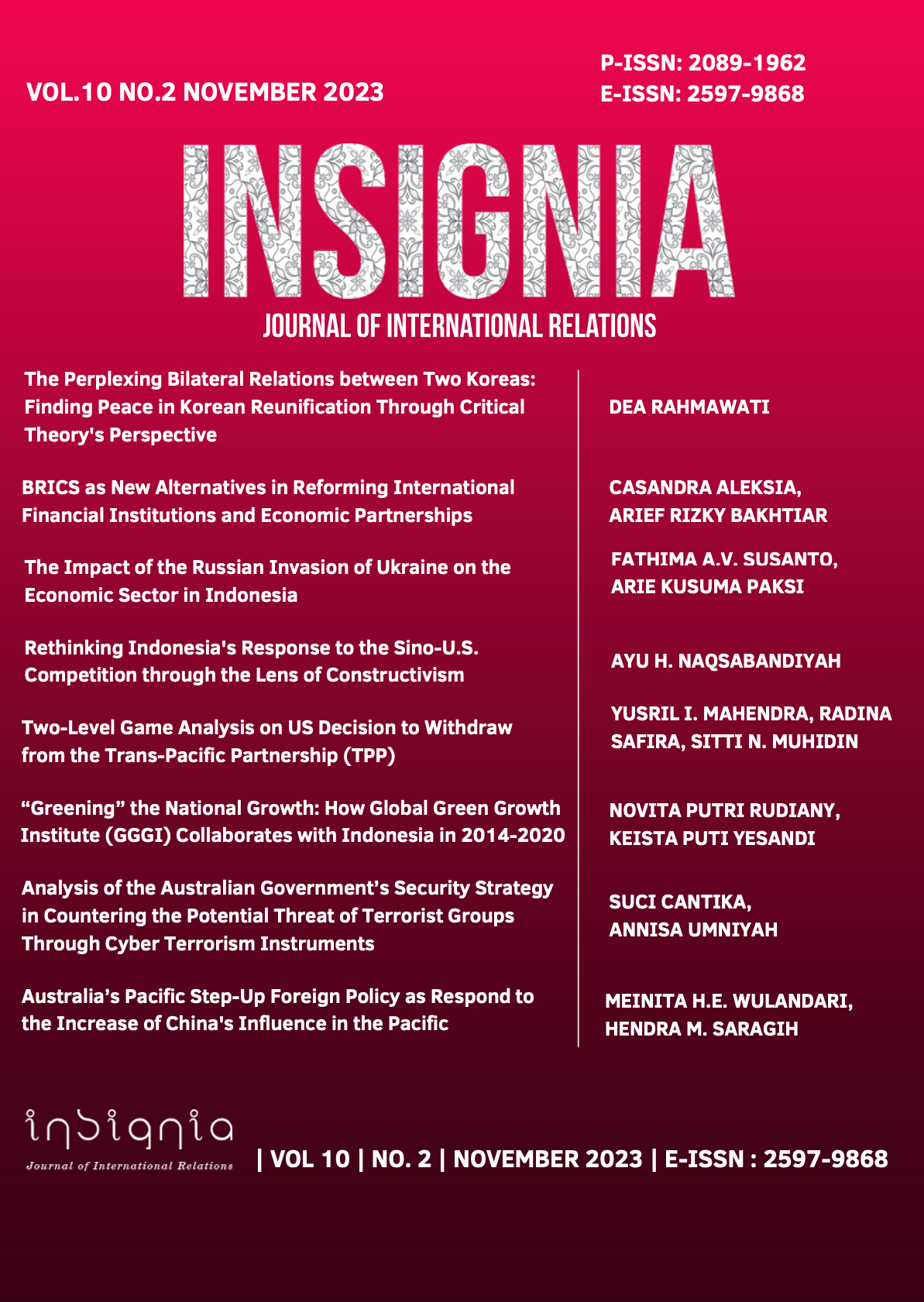“Greening” the National Growth: How Global Green Growth Institute (GGGI) Collaborates with Indonesia in 2014-2020
Abstract
With its natural richness, Indonesia is not immune from environmental, economic, and social problems. Indonesia remains facing the problem of greenhouse gas (GHG) emissions and environmental degradation resulting from economic activities caused by business-as-usual (BaU) activities. Therefore, Indonesia has developed a framework for a green growth program for national economic development with the Global Green Growth Institute (GGGI) since 2014. GGGI is an international organization that is specifically concerned about green growth at the global level. The Green Growth Concept was agreed upon at the 2005 Asia Pacific ministerial meetings in Seoul, South Korea. Indonesia also ratified the agreements to implement this green growth concept at the national level. This research elaborates on how GGGI, as a global actor, collaborates with Indonesia to develop the green growth framework. This study uses a descriptive qualitative research method with secondary data collection through literature, which will discuss GGGI's efforts to help implement the green growth program in Indonesia in 2014-2020. The case study is analyzed through the Management Approach, Normative Approach, and Enforcement Approach approaches. Through these three approaches, GGGI has succeeded in assisting Indonesia in implementing green growth in Indonesia in 2014-2020. Some of the programs that have been achieved include the eCBA program, the development of Special Economic Zones (KEK), and the implementation of the legal regulations in force in Indonesia.
Keywords: enforcement approach, Global Green Growth Institute (GGGI), Green Growth program, management approach, normative approach
References
Azhari, J.N. (2020). Upaya Pemerintah Indonesia dalam Mewujudkan Ekonomi Hijau Melalui Program REDD+ di Kawasan Taman Nasional Sebangau Kalimantan Tengah. Malang: Universitas Muhammadiyah Malang.
KLHK. (2021). Kerangka Kerja Investasi untuk Mengurangi Emisi dari Deforestasi dan Degradasi Hutan serta Peran Konservasi, Pengelolaan Hutan Berkelanjutan dan Peningkatan Stok Karbon Hutan (REDD+) di Indonesia. Direktorat Jenderal Pengendalian Perubahan Iklim, Kementerian Lingkungan Hidup dan Kehutanan.
O’Donnell, K. (2012). The Global Green Growth Institute: On a Mission to Prove Green Growth. New York: Council of Foreign Relations.
Sugiyono, A. (2014). Permasalahan dan kebijakan energi saat ini. Prosiding Peluncuran Buku Outlook Energi Indonesia 2014 & Seminar Bersama BPPT dan BKK-PI. Jakarta: Badan Pengkajian dan Penerapan Teknologi, 9-16.
Electronic Book
Bappenas. (2018). Pertumbuhan Ekonomi Hijau Dan PerencAnaan Investasi: Panduan untuk Menggunakan Analisis Biaya - Manfaat yang Diperluas (eCBA). Accessed from http://greengrowth.bappenas.go.id/wp-content/uploads/2018/05/Pertumbuhan-Ekonomi-Hijau-dan-Perencanaan-Investasi_ID_2016.pdf
GGGI. (2015). Mewujudkan Pertumbuhan Ekonomi Hijau untuk Indonesia yang Sejahtera: SINTESIS, Sebuah Peta Jalan untuk Kebijakan, Perencanaan dan Investasi. Accessed from http://greengrowth.bappenas.go.id/wp-content/uploads/2018/05/20160510161722.GGGI_Roadmap_Synthesis_Ind_lores_spread.pdf
GGGI. (2018). Review of GGGI Programme in Indonesia 2012-2017: Final Report 27 March 2018. Accessed from https://gggi.org/wp-content/uploads/2021/12/Norway-2018-mid-term-evaluation-of-GGGI-Indonesia-Final-report.pdf
GGGI. (2021). GGGI Technical Report No. 19 September 2021 Green Recovery and Climate Action: Assessing Green Jobs from Renewable Energy and Forestry Investments for Developing and Emerging Economies. Accessed from https://gggi.org/wp-content/uploads/2021/09/WEB_GGGI-Technical-Report-No-19-Green-Jobs_FINAL_v02.pdf
Chapter in Book
Joachim, J., Reinalda, B., Verbeek, B. (2008). International Organizations and Implementation: Pieces of the Puzzle. In Joachim, J., Reinalda, B., Verbeek, B. (Ed.), International Organizations and Implementation: Enforcers, Managers or Authorities. (pp. 1-18). London and New York: Routledge.
Journal
Kasztelan, A. (2017). Green Growth, Green Economy And Sustainable Development: Terminological And Relational Discourse. Prague Economic Papers, 26(4), 487-499.
Kristianto, A. H. (2020). Sustainable Development Goals (Sdgs) dalam Konsep Green Economy untuk Pertumbuhan Ekonomi Berkualitas Berbasis Ekologi. Business, Economics and Entrepreneurship, 2(1), 27-38.
Saepudin, A., Muryantini, S., & Maghfiroh, H. D. (2020). Kebijakan Indonesia Dalam Mewujudkan Industri Hijau (Green Industry) Masa Pemerintahan Presiden Joko Widodo. Eksos LPPM, 2(2), 166-177.
Satbyul, K. E., Ho, K., Yeora, C. (2014). A New Approach to Measuring Green Growth: Application to the OECD and Korea. Futures, 63, 37–48.
Sihaloho, T., & Muna, N. (2010). Kajian Dampak Ekonomi Pembentukan Kawasan Ekonomi Khusus. Buletin Ilmiah Litbang Perdagangan, 4(1), 75-101. https://doi.org/10.30908/bilp.v4i1.150
Newspaper Article: Online
GGGI. (2022). “Tentang Kami”. http://greengrowth.bappenas.go.id/tentang-kami/
Bappenas. (2018). “HCA PEMERINTAH INDONESIA-GGGI DISAHKAN, PERKUAT UPAYA PERTUMBUHAN HIJAU DI INDONESIA”, http://greengrowth.bappenas.go.id/hca-pemerintah-indonesia-gggi-disahkan-perkuat-upaya-pertumbuhan-hijau-di-indonesia/

This work is licensed under a Creative Commons Attribution-NonCommercial-ShareAlike 4.0 International License.
1. The author retains copyright and grants the journal the right of first publication with the work simultaneously licensed under a Creative Commons attribution license that allows others to share the work within an acknowledgment of the work’s authorship and initial publication of this journal.
3. Authors are permitted and encouraged to post their work online (e.g., in institutional repositories or on their websites) before and during submission, as it can lead to productive exchanges and earlier and more extraordinary citations of published works.


.png)


